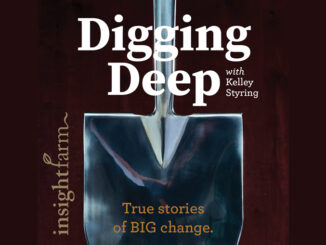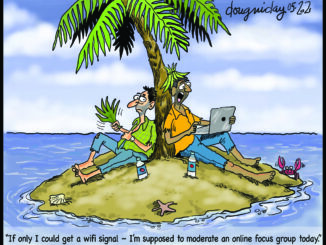
By Angela Weghorst
Research-Based Marketing Consultant,
Author, and Keynote Speaker
TwinQ: Insights & Inspiration
Utrecht, Netherlands
angela@twinq.nu

I remember conducting a powerful interview with Jim, a 17-year-old boy, about the impact of COVID-19 on young people. At one point, he proudly, almost provocatively, told me about his involvement in a major riot against the lockdown and curfew measures. While telling his story, I could sense he was watching me closely, checking if I would judge him. I didn’t. I simply smiled and said I sensed he expected a negative reaction, but I had no judgment, just curiosity. He laughed, surprised and disarmed by my honesty, and I instantly knew he had been testing me. I must have passed; it sparked a beautiful, honest conversation. He explained that one reason for joining the riot was to release the energy bottled up during lockdown. But it was also a way of “fighting the system,” which led to a much deeper discussion. “I feel different,” he said. “Like I don’t belong in this strange, crazy world. I even became depressed and needed help. But it took a year before I could see a therapist, due to their intense workloads. When I finally got there, I quit after two sessions. She didn’t try to understand me, just ticked boxes.” He paused, then added, “To be honest, this is the first time I feel someone is truly trying to understand me.”
For nearly 20 years, I’ve immersed myself in Gen Z’s world to understand who they are beneath the surface. With a background in industrial design, marketing, and intuitive development, I love uncovering what lives deep inside people’s hearts and turning it into insights and inspiration. Through countless qualitative studies and by guiding over 250 students in personal development, I realized some negative perceptions of Gen Z didn’t align with my findings. Many hide their deepest feelings out of fear of being judged for not fitting the “norm”: how they look, act, or feel. Social media only amplifies this, presenting idealized images that even influencers can’t live up to. Despite all the efforts around inclusion, we often overlook one simple truth: everyone is different. Whether it’s skin color, weight, height, sexuality, accent, hair, glasses, education level, or neurodivergence, no one fits every ideal or “norm.” Again and again, I heard young people say, “I feel different, like I don’t fit in.” That hit me.
This inspired me to dig deeper. In 2015, I launched a large-scale study in the Netherlands, starting with 60 in-depth interviews with 5- to 25-year-olds and 11 parents. I simply wanted to understand who they were, what truly mattered to them. As a homework assignment, I asked them to create a photo story of their lives and reflect on their friends, heroes, dreams, fears, passions, and talents. The interviews ranged from 10-minute chats with 5-year-olds to intense four-hour conversations, and I’m deeply grateful for their openness. Many dropped their carefully crafted masks and allowed me a glimpse into their hearts. The most powerful moment came when I told them that many others also felt “different.” Watching their faces light up with recognition and relief was priceless.
That moment led me to expand the study with a quantitative survey of approximately 4,000 young people. For children up to age 12, their parents (around 1,500 in total) completed the questionnaire together with them, including a separate set of questions specifically for parents. This helped ground the insights into solid data. The results and interview excerpts were published in 2016 in my Dutch book Different: The True Story of Generation Z. For a while, I thought its relevance had faded, until a trendwatcher told me in 2023 it was more timely than ever: “You may have simply been ahead of your time.”
 Though the research took place in the Netherlands, I’ve noticed the insights apply globally. When you truly seek someone’s essence, cultural differences fade. As the digital world dissolves borders, Gen Z is more connected than ever before.
Though the research took place in the Netherlands, I’ve noticed the insights apply globally. When you truly seek someone’s essence, cultural differences fade. As the digital world dissolves borders, Gen Z is more connected than ever before.
Generation Z: Living from the Heart and Inner Wisdom
Each generation reflects its era and responds to the one before it. Looking back at the past century, I’m reminded of Maslow’s hierarchy of needs. His theory suggests that once a need is met, we strive for the next. With society evolving rapidly, each generation mirrors that progression, shifting its focus accordingly. If we extend Maslow’s model beyond basic needs and self-actualization, we reach the values he added in the final years of his work: intuition, inner wisdom, and living from the heart. That, to me, captures the motivations and behaviors of Generation Z.
Many Gen Zers navigate life guided by intuition, sensing things beyond logic. It’s one reason so many feel out of place in a society and educational system focused mainly on rationality. This is something I’ll explore further in this article: what it means, why I believe it defines this generation, and why it matters in research and marketing.
While these qualities aren’t exclusive to Gen Z, they now surface with greater visibility in this generation. I believe this partly stems from an upbringing by parents and grandparents who nurtured sensitivity, encouraged intuition, and encouraged their children and grandchildren to be true to themselves. That’s why I often refer to these earlier generations as the breakthrough generations.
 Neurodivergence: Negative Traits or Hidden Superpowers?
Neurodivergence: Negative Traits or Hidden Superpowers?
I noticed many Gen Z individuals are highly sensitive to noise, crowds, clothing, atmospheres, or emotions. These sensitivities are now often labeled as traits of neurodivergence. To explore how many in Gen Z carry a label like HSP, giftedness, dyslexia, ADHD, ADD, hyperactivity, autism, dyscalculia, PDD-NOS, or Asperger’s, we asked participants in the quantitative study whether they had been diagnosed with or recognized these traits in themselves. One in four reported a diagnosis, and over 40 percent identified with at least one. But through many conversations, I sensed it was more than just symptoms.
Years ago, during an international qualitative study to map audience types, I noticed a strong link between people’s passions, talents, core values, and personalities. That insight stayed with me, so the quantitative study was a perfect chance to test it. Participants selected up to five passions, five talents, and eight core values. A cluster analysis revealed seven distinct personality types: the Artist, Action Hero, Romantic, Creator, Pragmatic, Buddy, and Intuitive.
What followed was eye-opening. We saw clear correlations between specific labels and personality types, echoing what I’d heard in interviews. Many young people who are labeled also show distinct passions or talents. Like a 10-year-old boy with autism who struggled socially but could name city populations or car speeds with ease. It made me wonder: what if these labels don’t just highlight difficulties but hidden strengths? What if their “feelers” are simply tuned to what truly fuels them? The data supported this idea:
- HSP individuals are deeply attuned to people, animals, and nature, and often excel at sensing emotions. They thrive through mindfulness, nature, or animal-related activities.
- Those with dyslexia or dyscalculia are visual thinkers who love creating, designing, and imagining vivid stories or concepts and often love philosophy or invention.
- Individuals with autism, Asperger’s, or PDD-NOS lean toward analytics and tech. They prefer to shut out emotional noise to focus deeply, whether that’s programming, repairing, or building. Solitude and hands-on tasks help them reset.
Surprisingly, there was no clear link between ADHD and physical activity, though I expected one. But we did see that those with ADHD or ADD spend less time outdoors, often under seven hours a week. Often due to limited access to nature or little parental encouragement.
Although labels can help explain certain behaviors, they often reduce Gen Z’s young people to what’s “wrong” with them. In doing so, we risk overlooking the talents and passions behind the label. That one-sided view may also explain the clear happiness gap between those with and without a label. It’s time we shift our perspective, not just to understand these young people better, but to truly see them for who they are.
 A New Sensitivity Emerging: Intuition and the Unexplainable
A New Sensitivity Emerging: Intuition and the Unexplainable
Beyond the sensitivities often linked to neurodivergence, I noticed something even more intriguing: many Gen Zers seem attuned to unexplainable stimuli, a kind of intuitive awareness that transcends logic. Over the years, I’ve heard remarkable and deeply personal stories, sometimes shared for the very first time, and often with more in common than expected.
- Intuition: A mother told me about her 12-year-old son who reacts strongly to certain places. “We were walking in the woods,” she said, “and passed a spot that felt . . . off. He suddenly froze, turned pale, and shouted, ‘We have to go now!’ He couldn’t explain it, but the fear in his eyes was real.”
- Clairsentient: While many clairsentient young people sense others’ emotions, I also heard examples of physical sensations. A 15-year-old girl told me, “Lately, when someone claps or picks something up, I sometimes feel it in my own hands, like it’s happening to me.”
- Telepathy: A 12-year-old girl shared, “I always know exactly what my mom is thinking. Even when she tries to surprise me, I already know. Sometimes I pretend I don’t, just so I won’t ruin it for her.”
- Precognition (ESP): A 20-year-old woman remembered telling her worried mother not to stress about selling their house. “I told her the exact date it would be sold, and for what price. I just knew. And it happened exactly like I said.”
- Psychic: A 12-year-old boy described what happens when he’s sad at night. “Sometimes I hear someone whisper my name. When I look around, I see my grandmothers standing next to my bed, smiling. They don’t say anything, but they make me feel safe, like I’m not alone.”
 Many of these stories had never been shared before, not even with parents, often out of fear of being dismissed or ridiculed. Interestingly, several came from labeled young people, making me wonder: could their wiring be linked to these experiences? We compared responses from diagnosed and undiagnosed youth; the differences were striking and statistically significant.
Many of these stories had never been shared before, not even with parents, often out of fear of being dismissed or ridiculed. Interestingly, several came from labeled young people, making me wonder: could their wiring be linked to these experiences? We compared responses from diagnosed and undiagnosed youth; the differences were striking and statistically significant.
- Young people with a neurodivergent label (except ADHD) are significantly more likely to say they enjoy or are good at “paranormal abilities.” For clairvoyance, this applies to all labels except ADHD and dyslexia.
- Those with HSP, giftedness, ADD, hyperactivity, dyscalculia, or Asperger’s are more likely to say they can “read other people’s thoughts.”
- In contrast, young people with autism, Asperger’s, or PDD-NOS are less likely to enjoy sensing others’ emotions.
While topics like intuition and psychic experiences still carry some taboo, they’re far from new. Historically, they were part of being human. But as science replaced spirituality, they became harder to discuss. In our research, 60% of Gen Z reported having at least one of these intuitive experiences, and 80% showed genuine interest.
For many, this sensitivity is core to how they see themselves and is one of the reasons they feel different. But when they meet someone open to it, they share their experiences with relief. The more I talk about it, the more incredible stories I hear. Since most Gen Zers are at least curious about these topics, brands have an opportunity to connect by daring to be different in this area as well. But this only works if it’s done in a truly authentic way, something I’ll touch on later. Something is shifting.
 Gen Z’s Search for Meaning and Zen Creates an Early Midlife Crisis
Gen Z’s Search for Meaning and Zen Creates an Early Midlife Crisis
Gen Z has grown up in a digital world where anything seemed possible, but they’re coming of age at a critical moment in history. They’re facing major global challenges: years of COVID isolation, anxiety about weather extremes, and global warring conflicts. As one student put it, “The materialistic mindset of the past century has wrecked our world. It’s time for radical change.”
This generation wants to do things differently and contribute to a better world. They embrace ideals reminiscent of the hippie movement: seeking purpose, meaning, and inner peace. They see Mother Earth not as a resource hub, but as something sacred. They enrich the practical mindset of Generations X and Y with intuition and sensitivity. Where individualism once reigned, they make space for empathy and community.
Gen Z is socially engaged, with more than half saying they enjoy helping people or animals. Their love of nature is strong and continues to grow. They also embrace the digital world, where crowdfunding and constant connection help bring ideas to life outside the traditional financial system. More than ever, they are discovering the power of the collective.
But these challenges take their toll. Gen Z faces growing levels of stress, loneliness, sleep issues, depression, and behavioral problems, leading to a rising need for mental health support. As Jim shared earlier, waiting a year for care is more the norm than the exception. When help finally comes, many still feel unseen or misunderstood.
In the past, a renewed search for identity and meaning surfaced around midlife, typically in the 40s or 50s. Today, it starts much earlier. Many in their 20s already feel like they’re in a midlife crisis. Beyond the global pressure, other key factors contribute:
- Existential questions arise earlier: Why am I here? Where do I come from? What’s the meaning of life? What happens when I die?
- Parents encourage authenticity and urge their children to follow their hearts. Yet that first requires knowing what that truly means.
- A traditional school system, long focused on logic and structure, offers little room for creativity or intuition and now clashes with Gen Z’s sensitivity and resistance to authority.
As a result, more young people are taking a break, skipping or delaying college to find themselves and (re)discover what truly brings them joy. Their search for meaning often leads them to spirituality, religion, nature, or a journey around the world.
Beyond Data: The Power of Real Connection
I hope reading about Gen Z’s unique qualities has already offered some direction on how to connect with them: whether as a researcher, marketer, or parent. In the end, it all comes down to one thing: real connection, grounded in authenticity and honesty.
Gen Z values honesty and authenticity more than money, status, or power. Raised in a world full of filters and curated perfection, they quickly sense when something feels off. I’ve seen plenty of campaigns fall flat because Gen Z could tell a brand promise was just a hollow marketing trick.
From my experience, these best practices make the biggest difference when working with Gen Z:
- Start with qualitative research. Gen Z can’t be captured by surveys alone. If a survey doesn’t engage them, they’ll just click through. I always begin with interviews and build the quantitative part using their own words.
- Be fully present. The ability of Gen Z to read the room goes far beyond body language. They demand honesty and emotional safety. Anything less, and they’ll disengage.
- Go beyond words. Sometimes I reflect on what I observe: “You’re saying this, but your body language says something else.” That’s often the real breakthrough.
- Be honest, even about discomfort. If someone zones out during a session, I gently name it. They sense it anyway, and honesty builds trust.
- Adjust to neurodiversity. With HSPs, I stay grounded and calm. For those on the autism spectrum, I use clear, concrete questions or relatable scenarios. Visual thinkers benefit from language they can picture.
Gen Z reflects the spirit of our time: living from the heart, seeking meaning, and valuing connection. But to fully blossom, they need us to bring openness, trust, and authenticity to the table.




